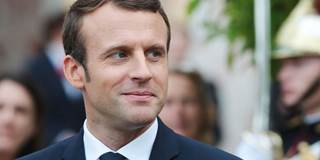France’s rejection of far-right populism has restored faith in the beleaguered EU, but the true test of the bloc’s staying power will be fiscal governance. While no one expects major reforms anytime soon, several technical changes – and national-level experimentation – can and should be implemented immediately.
LONDON – Emmanuel Macron’s victory in the French presidential election on May 7 triggered a surge of optimism about the future of the European Union, and the eurozone in particular. This is partly because Macron ran an unambiguously pro-EU campaign, and was rewarded for it. But it is also because the threat of a populist government in one of the EU’s founding states is, for the moment at least, a thing of the past.
Yet renewed EU enthusiasm should not be mistaken for unwavering confidence. As Macron himself surely understands, the EU’s long-term viability requires that the “European project” appeal to its citizens more than its leadership. EU leaders therefore must – and probably will – take this opportunity to revitalize efforts to address security, migration, and growth challenges.
There is, however, an elephant in the room: the need for eurozone governance reform. At the moment, eurozone reform talks are not a priority for leaders in France, Germany, or anywhere else. That partly reflects a decrease in the risk of financial instability; but “reform fatigue” among members is a factor as well. The EU’s institution-building efforts pursued over the last few years have stalled. Further progress will require accepting a degree of risk-sharing throughout the bloc, and that will be possible only with more campaigning and possible national referenda. For now, political expedience favors the status quo.

LONDON – Emmanuel Macron’s victory in the French presidential election on May 7 triggered a surge of optimism about the future of the European Union, and the eurozone in particular. This is partly because Macron ran an unambiguously pro-EU campaign, and was rewarded for it. But it is also because the threat of a populist government in one of the EU’s founding states is, for the moment at least, a thing of the past.
Yet renewed EU enthusiasm should not be mistaken for unwavering confidence. As Macron himself surely understands, the EU’s long-term viability requires that the “European project” appeal to its citizens more than its leadership. EU leaders therefore must – and probably will – take this opportunity to revitalize efforts to address security, migration, and growth challenges.
There is, however, an elephant in the room: the need for eurozone governance reform. At the moment, eurozone reform talks are not a priority for leaders in France, Germany, or anywhere else. That partly reflects a decrease in the risk of financial instability; but “reform fatigue” among members is a factor as well. The EU’s institution-building efforts pursued over the last few years have stalled. Further progress will require accepting a degree of risk-sharing throughout the bloc, and that will be possible only with more campaigning and possible national referenda. For now, political expedience favors the status quo.